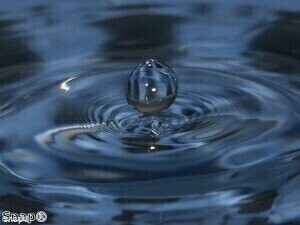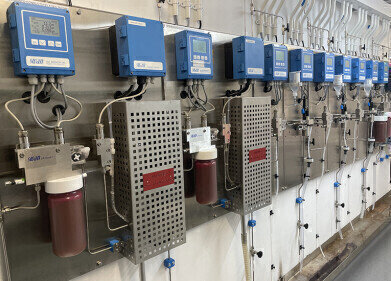Water Quality Monitoring
Student-made water quality monitor can help isolated communities track safe water sources and avoid contamination
Nov 14 2023
A portable water quality monitor created by a team of University of Bath students could help to rapidly detect and map safe water sources for communities around the world.
The OASIS device, created by Team Bath Biodevices without Borders, combines innovative water diagnostic and GPS technology to carry out rapid water quality analysis and plot the results to a global map.
When dipped in water, the device determines the quality and safety of the water by using a series of small electrochemical sensors to detect a range of contaminants, including chlorides, fluorides, and nitrates, as well as its pH level, temperature and turbidity (or clearness).
Results are then displayed on the device, and if a smartphone is connected, it can be uploaded and shared online.
The OASIS – short for On-site Aquatic Safety Inspection System – has been created by the student team, a Vertically Integrated Project (VIP) group. VIPs at Bath enable students from all year groups and across all University disciplines to collaborate with staff on long-term real-world issues.
The team recently drew on Bath’s longstanding links with South Africa‘s Stellenbosch University to field test the OASIS and then explore how the device could be integrated into local communities to enable safe water consumption and monitoring.
Team Leader Alexz Farrall says the project aims to inform and give opportunities to those who may be unaware of contaminated water sources, while enabling students to build practical skills that can benefit global communities. He adds: “We are creating an innovative and genuinely useable device that, with some further development, could really make an impact on water safety and water scarcity.
“The OASIS uses affordable sensors to enable rapid detection of several chemical markers, doing analysis that would otherwise take hours in a lab. When you submerge the device in water, it can instantly give feedback on how clean and drinkable a water source is. Combined with GPS technology, it can empower users to be aware of how harmful or safe a water source is and share it with their community.
“This could work in areas where water is scarce, potentially contaminated, or where agricultural work can cause quite rapid changes to water quality. It can provide a form of immediate detection of risks, or for situations such as a Cholera outbreak.”
OASIS device
The OASIS device works by employing an array of electrochemical sensors. When these sensors come into contact with water, they initiate a series of electrochemical reactions, which are affected by the presence, concentration, and type of contaminants in the water. By analysing the output of these reactions, the device can detect and quantify various clean water indicators.
While portable water sensors have previously been developed, the OASIS device’s distinction lies in its affordability and innovative integration of technologies. By designing cheap and reliable sensors and making their project open-source, the team aims to work with NGOs to bring the device into full production and make it available in areas where they operate.
Dr Despina Moschou, Senior Lecturer in Bath’s Department of Electronic & Electrical Engineering and a member of the CBio Centre for Bioengineering & Biomedical Technologies, is the team’s academic director..
Dr Moschou says: “The device is sophisticated and addresses a major global problem in a simple and potentially very affordable way.
“The work the team has done to find out how to apply their knowledge to this problem, building their skills and real-world problem solving is truly impressive.”
Farrall adds: “One of the key issues we’re focusing on is how to provide a useful and usable data infrastructure alongside strong capability and detail.
“Longer-term, you could use different attachments to have the sensors monitor every tap, pipe, or river to increase awareness and more quickly determine outbreaks or contaminant sources.”
Future plans for collaborations
Work on the device started shortly after the formation of the team two years ago. Farrall, who completed a Master’s in Human-Computer Interaction at Bath and is currently working on a PhD in developing new mental health technology, explains: “We came together as a group, asking ‘what do we believe to be an important issue to focus our attention towards?’. Water scarcity reaches across the globe and is an issue that will affect more people as the rise of pollutants increases. We wanted to support current and future issues that align with everyone's basic human rights.”
Next up for the team is making the device more efficient and affordable and adding greater sensitivity and detection towards a range of contaminants. Additionally, they aim to explore its potential to address socio-economic challenges aiming to create water quality monitoring jobs for locals and in taking on other projects, such as helping to creating building materials from plastic waste.
Team Bath Biodevices has been backed with funding and support from the University’s Department of Electronic & Electrical Engineering and Faculty of Engineering & Design, as well as Bath’s Impact Acceleration Account.
The Biodevices team aims to bring their device to production by seeking collaborations with industrial partners or further funders and sponsors.
The members of Team Bath Biodevices are Alexz Farrall, Vrinda Raninga, Jorge Palop Suarez, Jian Lu Helsby, Cris Dignadice, Ming Lee, Tara McKenna, Jordan Dawson, Alexa Mesham, Melissa Mitchell, Shay Patel, Daniel Light, George Madeley, Jonathan Pugsley, and Jamie Workman.
Digital Edition
AET 28.2 April/May 2024
May 2024
Business News - Teledyne Marine expands with the acquisition of Valeport - Signal partners with gas analysis experts in Korea Air Monitoring - Continuous Fine Particulate Emission Monitor...
View all digital editions
Events
Jul 30 2024 Jakarta, Indonesia
China Energy Summit & Exhibition
Jul 31 2024 Beijing, China
2024 Beijing International Coal & Mining Exhibition
Aug 07 2024 Beijing, China
IWA World Water Congress & Exhibition
Aug 11 2024 Toronto, Canada
Aug 25 2024 Stockholm, Sweden and online









.jpg)








